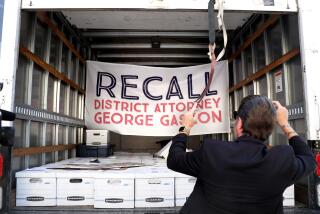Signerâs remorse on unread document
Question: Iâm a widow living alone in my townhome. A resident who lives here had been pestering me with incessant phone calls wanting me to âsupport his causeâ by signing a piece of paper. I put him off several times, but he showed up at my front door, handed the paper to me and said my signature was the last one needed. I asked what it was for, but all he said was that we needed to protect the association and not to worry because everyone else had signed but me.
Without reading, I signed because he used to be on the board and I trusted him. Heâs gone out of his way to help me with my maintenance problems, and I did not want him to be mad at me, so reluctantly I signed. I didnât know what I had agreed to, and he didnât give me a copy.
For at least a year before this, he was nice to me. Now I know why. Today, I learned that my signature on that paper meant I had agreed to let the board amend the governing documents and, that once recorded, these changes would affect my title. I am emphatically against those changes. Immediately I phoned him and explained I wanted to retract my signature. He said my signature was permanent because I had signed a ballot.
When he shoved that pen and paper in my hand, he never explained what I was agreeing to or that my signature was irrevocable. Like me, other single women were also deceived into signing.
I attended the next board meeting and watched him interact with the president, who arrogantly announced that the man had delivered the board âa done deal.â I am distraught over this situation and want to know, can I take my signature back?
Answer: This âdone dealâ could be construed as a violation of the boardâs good faith fiduciary duty owed to all titleholders. It creates a level of distrust in the board that ought to lead to its resignation or removal.
As underhanded as this tactic appears in its efforts to disenfranchise owners, it succeeds when owners fail to read and understand everything they are asked to sign. That failure is magnified when the results can affect the title to oneâs home.
Guidelines for amending homeowner association governing documents, in part, can be found throughout Civil Code sections 1350 to 1376 of the Davis-Stirling Act and the associationâs documents themselves. Amendments to governing documents must be presented to the homeowners in writing at least 30 days before any vote is taken on the proposed changes. That would include a reference to the corresponding section of the document at issue that is currently in force, proposed wording to replace that section and an explanation in laymanâs language of the reason for, and the effect of, each suggested revision.
Titleholders must be given time to have these revisions independently reviewed by their own counsel before signing and must never make this decision without that basic information.
Determining what you signed and the origin of the paper bearing your signature could be important. Ballots can be invalidated for any number of reasons, and depending on the ballotâs origination, it may or may not be valid.
In a homeowners association, only the board of directors can initiate voting propositions affecting residential deed-restricted titleholdersâ governing documents. To be adopted, such propositions must follow the law and be discussed in open board meetings that are documented in the minutes before any circulation asking for a vote.
The situation you describe is unique in this respect: The person distributing the so-called ballots did not appear to be doing so legitimately. He is not presently a board member, nor is he a member of a duly appointed committee of the board, despite appearing to be or representing that he was.
In the legal sense, actions requiring titleholder votes must originate from the board, making these ballots worthless even though signed.
Scenarios like the one described can occur when a board intentionally disregards titleholdersâ best interests or believes it is above the law. Board actions based on votes acquired in this fashion risk having those actions declared void. The board or this particular homeowner may have to reimburse the association for any damages that result, including attorney fees that might be incurred in any homeowner lawsuit to reverse changes based on an illegal ballot.
The most important warning all residential deed-restricted titleholders must heed is never, ever sign anything without reading and understanding the legal ramifications of what you are asked to sign. Always obtain an independent legal opinion other than that represented by the board or its attorney.
Any time an owner is rushed into signing a document or told âEveryone else has signed but you,â donât sign. Take pains to verify that the statements made are true.
Oral misrepresentations or half-truths are hard to prove in court. Ask that statements be put in writing and signed by the person making them. If the presenter of the âpaperâ writes something other than what was represented orally, or refuses to put it in writing, do not sign.
Treat every document, letter, note, message, flier and taped answering machine message from a homeowners association as possible evidence for later use. To prove wrongdoing, it will be mandatory to establish that misrepresentations were made in connection with a particular issue or vote. The evidence collected could be used to support claims of trickery or covert actions taken in violation of the Open Meetings Act.
Propositions meant to benefit all titleholders will be presented legitimately at an open meeting of owners called for that purpose. When someone relentlessly exerts pressure to obtain signatures for a cause, it is reason enough not to trust the messenger, let alone the document.
Questions can be sent to P.O. Box 11843 Marina del Rey, CA 90295 or e-mailed to NoE[email protected].


